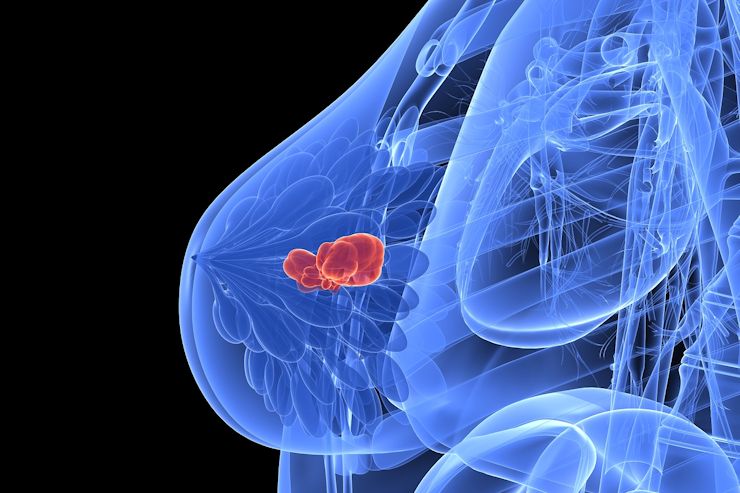Symptoms of breast cancer during breastfeeding
Women who are breastfeeding are more aware of breast changes. Some women notice cancerous tumors inside the breast while breastfeeding. Women who develop breast cancer before or during breastfeeding are always concerned about whether breastfeeding is possible if they have breast cancer and whether cancer treatment will affect breast milk.
Is breastfeeding possible if you have breast cancer?
It is possible but rare. 3% of women with breast cancer are breastfeeding. According to the National Cancer Institute, some research has shown that the risk of breast cancer increases during pregnancy, and this may be due to hormonal changes during pregnancy. But in general, breastfeeding, especially in premenopausal women, reduces the risk of breast cancer. During pregnancy and lactation, women are less likely to be exposed to hormones that increase the risk of cancer due to reduced menstrual periods.
It is difficult to diagnose breast cancer during breastfeeding for the following reasons:
The symptoms of breastfeeding and breast cancer are very similar.
Doctors usually do not examine women for breast cancer during breastfeeding.
Mammographic results are usually incorrect during breastfeeding.

What factors affect the formation of cancerous tumors during breastfeeding?
Breast congestion:
In the early weeks of breastfeeding, filling the breasts with milk is a natural thing that often upsets the mother. This problem usually resolves with regular breastfeeding, but in some women it still persists during breastfeeding. The symptoms and pain of breast congestion should go away when it is empty, but if not, breast cancer should be suspected.
Closure of the milk ducts:
Before the milk enters the milk ducts, some cells in the breast make it. If the infant drinks too little or too much milk, the milk ducts will become blocked, causing a painful lump in the breast. Frequent breastfeeding and breast massage along with the use of hot compresses will help relieve the symptoms.
Inflammation of the breast:
Inflammation and infection of the breast occurs when the milk ducts become blocked. When milk gets stuck in the breast, milk proteins are made and eventually leak into the surrounding tissues. This condition causes a hard lump in the breast that can cause other symptoms, including redness, fever, chills, and pain. Women with mastitis should breastfeed or have their breasts emptied.
Breast abscess:
Breast abscess is a rare but dangerous complication that occurs if breast swelling is not treated. An abscess is the body’s way of fighting an infection. A bag full of infection and pus whose surrounding tissue prevents the infection from spreading through the body. This problem requires immediate medical attention and should be treated with antibiotics.
Cysts:
Small cysts sometimes form in the breast and milk collects inside them. These cysts sometimes form and sometimes disappear depending on the amount of milk in the breast. These lumps are not painful and will disappear after breastfeeding.
When should I see a doctor?
In most cases, breast lumps in breastfeeding women are not cancerous and there is no reason to worry. However, if the lump does not disappear, continues to grow, and does not move by pressing into the breast tissue, causing the skin to fade or look like orange peel, it is best to see a specialist.
Is breastfeeding possible if you have breast cancer?
In most cases, your doctor will advise your breastfeeding mother to stop breastfeeding after being diagnosed with breast cancer, as most breast cancer treatments have a negative effect on the baby or toddler.
The doctor will help the mother determine which treatment is best for the person with breast cancer. Possible treatments for breast cancer during breastfeeding include:
Surgery:
Surgery may be needed to remove the cancerous mass or tissue. Sometimes this surgery involves a mastectomy (removal of the breast) or a double mastectomy (removal of both breasts). The amount of surgery will determine if the mother can continue breastfeeding.
Chemotherapy:
Chemotherapy uses strong drugs to kill cancer cells in the body. Women undergoing chemotherapy should stop breastfeeding.

A person necessarily help to make severely posts I’d state. That is the first time I frequented your web page and up to now? I amazed with the research you made to create this particular put up amazing. Wonderful task!
You make me see things in a new light. illplaywithyou
I intended to send you this very small observation to be able to thank you very much yet again just for the gorgeous secrets you’ve featured on this site. It’s really generous of you to present unreservedly all many of us would’ve made available as an ebook to end up making some money for themselves, certainly considering the fact that you could have done it if you ever desired. The techniques also worked to become great way to recognize that other individuals have the identical eagerness the same as my personal own to figure out a lot more regarding this problem. I think there are numerous more fun situations up front for folks who scan through your blog post.
Thanks for making this so enjoyable. illplaywithyou
You have a gift for explaining things clearly. illplaywithyou
You have a real knack for this. illplaywithyou